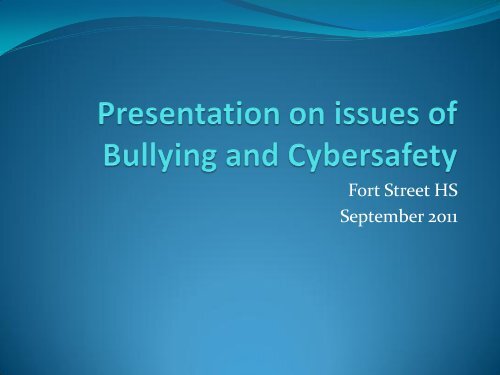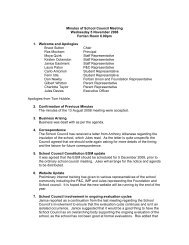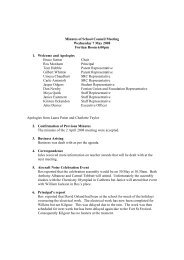Bullying - Fort Street High School
Bullying - Fort Street High School
Bullying - Fort Street High School
You also want an ePaper? Increase the reach of your titles
YUMPU automatically turns print PDFs into web optimized ePapers that Google loves.
At <strong>Fort</strong> <strong>Street</strong> HS• The incident is recorded on the school system.• For additional consultation, advice and support, the bully,victim and bystander are referred to Peer Mediation and/or counselling by the teacher, Year Adviser, Head Teacherand/or Deputy Principal.• In cases of repeat offenders or if physical violence isinvolved, the student who bullies could be suspended fromschool following the DET Suspension and Expulsionguidelines.• Students and parents are made aware of the Departmentalappeal procedures.
At <strong>Fort</strong> <strong>Street</strong> HS• Students are encouraged to report incidents ofbullying to teachers, Year Advisers, Deputy Principal,and Peer Support Leaders.• <strong>Bullying</strong> surveys are conducted in <strong>Fort</strong>unae lessons inYear 7.• Parents report bullying behaviour to the staff andcounsellor.
How to raise resilient kids• It's important for your child to know how to turnthings around when the going gets tough.• Children with good resilience perform better at school.• Children with good resilience are less likely to takepart in risky behaviour.• Helping a child feel successful is an important aspectof resilience
Cyberbullying prevention – tips for parents• Talk to your child about cyberbullying before ithappens.• Be aware of what your child is doing online.• Don't simply ignore cyberbullying.• Watch for changes in mood and behaviour in yourchild.• Report abuse to the relevant authorities.
Say NO to cyberbullying – tips forparents• Talk to your child about cyberbullying before it happens. Work out strategies toaddress cyberbullying that both of you are comfortable with so your childknows what to expect if they do report their concerns to you.• Establish one or two other trusted adults your child is comfortable inapproaching about their concerns.• Be aware of what your child is doing online and explore it with them.• Keep the lines of communication open so your child will be comfortable abouttalking to you if something is worrying them. Help your child to develop theskills they need to interact safely and respectfully online. Guide their onlineactivities and help them learn to communicate appropriately with friends andfamily.• Try to locate the computer in a shared or visible place in the home.• Discuss the kinds of sites that are ok to explore and those that are not and haveclear rules about online activities.• Help your child to block anyone who sends offensive content. Most socialnetworking services allow users to block and report someone who is behavingbadly.
What to do if you think your childis being cyberbullied• Discuss any changes in mood or behaviour with them. If you areconcerned, help your child to stay connected to friends and family theytrust.• Notify the police immediately if you have serious concerns for yourchild's safety.• Work with your child to save some evidence of cyberbullying behaviour– it may need to be followed up by the child's school, internet serviceprovider (ISP), mobile phone carrier or the police.• If you need to involve your child's school, ask them to thoroughlyexplain their processes so that you can work toward achieving a positiveoutcome. (NSW public schools have anti-bullying policies which youcan ask to see, or can often find on their websites.)• Cyberbullying won't stop if it's ignored – you can help by listening toyour child and working with them to take control of the situation
Stopping Cyber <strong>Bullying</strong> at <strong>Fort</strong> <strong>Street</strong> HS• Contact the Deputy Principal or HT T&L/Welfare• If the cyber bullying incident is on the department’ssystem we can assist in shutting it down and we canaccess the IT services and the Legal Branch to assist us.• We will draw on the support of the Police CommunityLiaison Officer
Cyber safety at <strong>Fort</strong> <strong>Street</strong> HS• On the first day of Year 7 orientation we introducedthe E Team to Year 7 students to discuss issues aboutcyber bullying and identity theft.• In our Boost programs we investigate these issueswith Year 7 to 9 students.• In Year 10 students undertake Digital Citizenshiptraining and next year this will also occur for studentsin Years 8 and 9
• Children who were most at risk were those who did nothave a strong interest in other activities.
• The report, The Impact of <strong>High</strong> Speed BroadbandDevelopment on Youth Consumption of Internet(online) Interactive Services and Consumer Well-Being,published last year by Dr Margee Hume and AssociateProfessor Gillian Sullivan Mort, stated it's actually notwhat children are doing online that is the problem, it'swhat they are doing offline which is the key to theirwellbeing.
The Impact of <strong>High</strong> Speed Broadband Development onYouth Consumption of Internet (online) InteractiveServices and Consumer Well-Being• The pair interviewed more than 150 childrenbetween the ages of 10 and 18 and found thoseinvolved in fewer extracurricular activities werealso the ones most likely to exhibit riskybehaviour online
The Impact of <strong>High</strong> Speed Broadband Development on YouthConsumption of Internet (online) Interactive Services andConsumer Well-Being• During the course of the study, Dr Hume found thatkeeping children occupied and active away from thecomputer for at least 30 minutes a day was one of thekey components of cultivating a healthy and saferelationship with the internet, and this is where parentscame to the fore.
The Impact of <strong>High</strong> Speed Broadband Development on YouthConsumption of Internet (online) Interactive Services andConsumer Well-Being• The results also showed that these children had abetter sense of self and wellbeing, and could balanceout instances of cyberbullying with their friendshipsaway from school and the web. They were also lesslikely to be negatively affected by bullying and couldswitch off or walk away
Why active kids are less likely tobe cyberbullied?• Kids who do extracurricular activities encounter lesscyberbullying.• Exercise strengthens resilience.• Socially connected kids are more able to switch offfrom online abuse.• Parents should ask their kids about their onlineactivities.• Computers should be in a shared area of the house –not the child's bedroom
Encourage your child to join• A co curricular program• Chess• IMP• Robotics• Debating• Drama Productions• A Knock Out Team
















